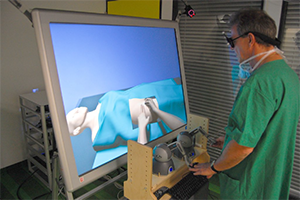Bimanual Haptic Simulator for Medical Training: System Architecture and Performance Measurements

In this paper we present a simulator for two-handed haptic interaction. As an application example, we chose a medical scenario that requires simultaneous interaction with a hand and a needle on a simulated patient. The system combines bimanual haptic interaction with a physics-based soft tissue simulation. To our knowledge the combination of finite element methods for the simulation of deformable objects with haptic rendering is seldom addressed, especially with two haptic devices in a non-trivial scenario. Challenges are to find a balance between real-time constraints and high computational demands for fidelity in simulation and to synchronize data between system components. The system has been successfully implemented and tested on two different hardware platforms: one mobile on a laptop and another stationary on a semi-immersive VR system. These two platforms have been chosen to demonstrate scaleability in terms of fidelity and costs. To compare performance and estimate latency, we measured timings of update loops and logged event-based timings of several components in the software.
@inproceedings {EGVE:JVRC11:039-046,
booktitle = {Joint Virtual Reality Conference of EGVE - EuroVR},
editor = {Sabine Coquillart and Anthony Steed and Greg Welch},
title = {{Bimanual Haptic Simulator for Medical Training: System Architecture and Performance Measurements}},
author = {Ullrich, Sebastian and Rausch, Dominik and Kuhlen, Torsten},
year = {2011},
pages={39--46},
publisher = {The Eurographics Association},
DOI = {10.2312/EGVE/JVRC11/039-046}
}

